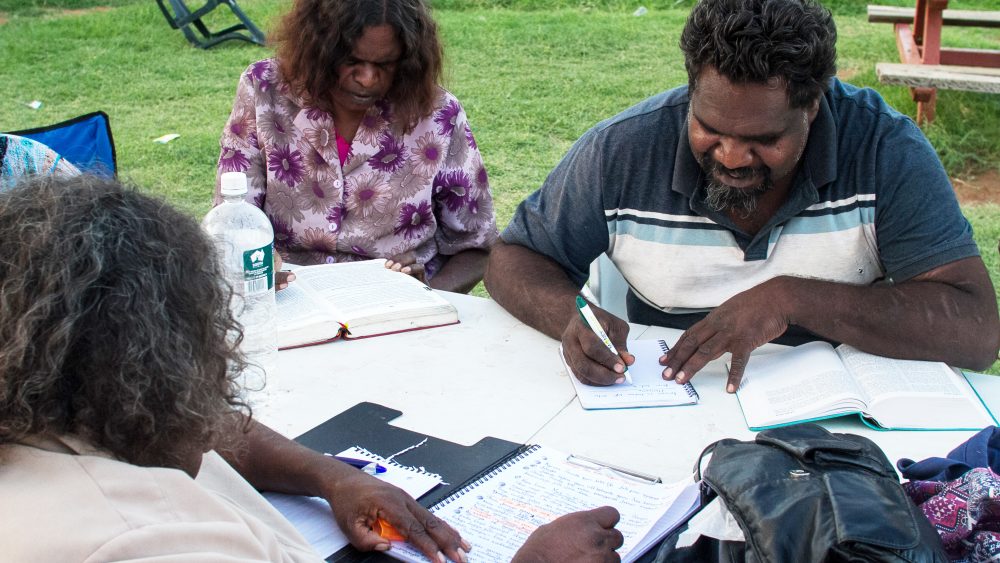A Bible in every language is within our grasp
“By 2033, if we keep the momentum up, we could see all languages having some Scripture.”
Here is the good news about Bible translation: it is getting faster. This means more people groups are getting the Scriptures in their own language each year than ever before.
The increase in the rate of Bible translation leads Michael Perreau, Director General of United Bible Societies (UBS), to a startling prediction: “Some people alive now will see some portion of the Bible available in every language on earth.
“They might have just the Gospels or the New Testament, and some others the whole Bible.
“By 2033, if we keep the momentum up, we could see all languages having some Scripture.
“I am not sure if I will live til then, but it is very exciting to think my children and grandchildren will live to see that.”
UBS, which represents Bible Societies around the world, has an updated snapshot of how the Bible is reaching more and more language groups.
There are some 6,000 languages in the world, with 1,000 minor languages, making a total of 7,000 languages worldwide.
“We have translations in 2,000,” Perreau begins. “We are working on 2,000. There are 2,000 we have not even begun.
“A third, a third and a third is a good way to put it.
“Now each year we complete between 25 and 30 translations.” – Mike Perreau
“Of course the populations are different for these languages. That tells a more optimistic story. But God wants ALL to have his word.”
Some languages have only a few hundred speakers, notably some of Australia’s indigenous languages. But a language group can up to be two million strong and not have a single verse of the Bible. This would be one of the larger groups falling into the third of Michael Perreau’s thirds.
Currently UBS is engaged in 451 translations, and is committed to full Bible translations for these groups.
The length of time to produce a Bible translation is reducing, and according to Perreau we are accelerating towards the target of having the Bible in every language.
“In 2011 we used to complete some five translations a year. Now each year we complete between 25 and 30 translations.
UBS is currently mentoring 1,200 local translators who might be local pastors and other workers on the ground.
“This means millions more people get the full Bible each year.”
There are four factors that make the increased pace of Bible translation possible according to Perreau.
- Digital technology is making the task quicker, putting translation tools in the hands of locals. Paratext, a joint product of UBS and missionary agency SIL, accelerates the translator’s work. They can input a first or revised draft of the text and check and review that draft against the biblical source texts and a selection of model translations and resource materials. Publisher’s Assistant, another programme, enables fast layout.
- Bible translators are no longer just the experts from rich countries. Mobilising local translators, makes the task faster and creates a Bible reading community. UBS is currently mentoring 1,200 local translators who might be local pastors and other workers on the ground. Perreau points out this means these days a Bible translation begins when a local group of churches demands it, rather than a mission group from overseas deciding to do it.
- Christian groups are working together on Bible translation better than before. An example is the Digital Bible Library run by UBS. It stores electronic texts, future proofing the Bible against being stranded in obsolete computer and media formats. It now holds 1,400 languages, and 1,500 texts. It’s the place other Bible agencies like YouVersion – the Bible App – get their texts. Global print-on-demand is on the way.
- “Every Tribe Every Nation” (ETEN) is a core group behind the changes. “For the first time it brings together significant components. The business community who have a heart for the work, and all of the key Bible agencies, to the same table,” says Perreau. “We look at ourselves as joint problem solvers.”
“There is a respect for every partner. That is the unique thing about ETEN. They release God’s treasure, the talent and the time for the work being done. They meet every month.
“We want to fund mission projects – but only one of everything,” is how one of the philanthropists put it to Eternity. The result has been one place to put digital texts (the Digital Bible Library), one group developing the software and so on. Cutting out duplicated effort has been important in focusing on the translation effort – and they have been part of the push to speed things up.
ETEN began as a US-based group but is spreading a web of partnership around the world, becoming more and more multi-cultural.
Perreau describes his job running the United Bible Societies: “It’s both a blessing and a burden. A blessing because you hold on to so many opportunities that God presents to you. But the burden is that there are so many who still wait and it is on your watch.”
Email This Story
Why not send this to a friend?



